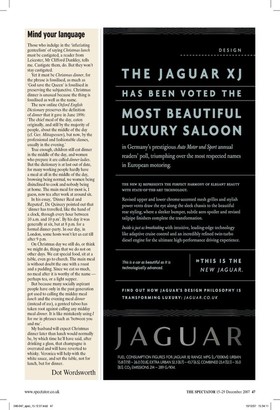Mind your language
Those who indulge in the 'infuriating genteelism' of saying Christmas lunch must be castigated, a reader from Leicester, Mr Clifford Dunkley, tells me. Castigate them, do. But they won't stay castigated.
Yet it must be Christmas dinner, for the phrase is fossilised, as much as 'God save the Queen' is fossilised in preserving the subjunctive. Christmas dinner is unusual because the thing is fossilised as well as the name.
The new online Oxford English Dictionary preserves the definition of dinner that it gave in June 1896: 'The chief meal of the day, eaten originally, and still by the majority of people, about the middle of the day (cf. Ger. Mittagsessen), but now, by the professional and fashionable classes, usually in the evening.'
True enough, children still eat dinner in the middle of the day, and women who prepare it are called dinner ladies. But the dictionary is at last out of date, for many working people hardly have a meal at all in the middle of the day, browsing being normal, we women being disinclined to cook and nobody being at home. The main meal for most is, I guess, now tea after work at around six.
In his essay, 'Dinner Real and Reputed', De Quincey pointed out that 'dinner has travelled, like the hand of a clock, through every hour between 10 a.m. and 10 p.m'. By his day it was generally at six, but at 8 p.m. for a formal dinner-party. In our day, in London, some hosts won't let us eat till after 9 p.m.
On Christmas day we still do, or think we might do, things that we do not on other days. We eat special food, sit at a table, even go to church. The main meal is without doubt the one with a roast and a pudding. Since we eat so much, no meal after it is worthy of the name — perhaps tea, or a light supper.
But because many socially aspirant people have only in the past generation got used to calling the midday meal lunch and the evening meal dinner (instead of tea), a genteel taboo has taken root against calling any midday meal dinner. It is like mistakenly using / for me in phrases such as 'between you and me'.
My husband will expect Christmas dinner later than lunch would normally be, by which time he'll have said, after drinking a glass, that champagne is overrated and will have reverted to whisky. Veronica will help with the white sauce, and set the table, not for lunch, but for dinner.

































































































 Previous page
Previous page